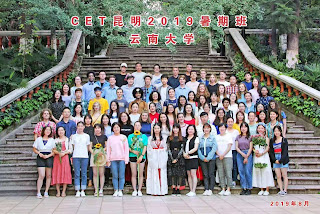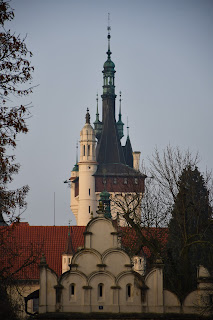Fuxian Lake and my first night in Sipsongpanna
A while back, I was eating lunch with a friend, who – familiar
with my packed travel itinerary – asked me whether I had been to Sipsongpanna
(Xishuangbanna in Mandarin) yet. Before that conversation, I had only heard
very vague things about Sipsongpanna, the most popular being the refrain “it’s
so hot!” I was intrigued, however, and decided to do some research.
Sipsongpanna is a prefecture of Yunnan populated – like the
rest of the province – by a bewildering mix of ethnicities. In Sipsongpanna,
the Dai people are the most populous, but the name “Dai” is more of an umbrella
term for several groups speaking different, closely-related languages. As far
as I can understand from the Wikipedia page, the Dai are a subset of the Tai,
which is a term that also includes the Thais and the Lao. The architecture of
Sipsongpanna looks remarkably similar to that of Thailand – massive, tent-like,
multi-layered roofs, and a proclivity for gold and rounded ornaments.
Getting to Sipsongpanna is easiest by plane, which incidentally
makes the drop in elevation (to 558 metres above sea level) unnoticeable until
one leaves the airport and is hit by a wall of hot, humid air. But I am getting
ahead of myself. My flight to Jinghong, the capital of Sipsongpanna, was to
leave a little after five on Friday. I thought that this would give me enough
time to get to the airport after sitting my weekly exam, but the exam was
cancelled once again and instead, the program was to make a trip to Fuxian
Lake. Now I am not one to complain about fun trips to fun places, but I told
the program leaders I would not be able to make it, as we were to return to
Kunming too late for me to catch my flight.
As luck would have it, on Thursday we took school pictures,
an occasion which my roommate deemed momentous enough to merit a return from
partying I-am-not-sure-where since Saturday. Unbeknown to me, my roommate had
been planning to join the trip to Fuxian, and he really wanted me to come. That
same evening, he helped me order a taxi for the next day to drive me all the
way from Fuxian to the airport. In the end, at an additional fee, I could have
the cake and eat it too.
CET program joint picture
Fourth-year Chinese take 1
Fourth-year Chinese take 2
Fourth-year Chinese take 3
My time at Fuxian Lake was short but pleasant. It was a very
sunny day, so most people wanted to ride boats and swim in the water, but water
is water, and those are all of my thoughts on that head. I decided instead to
do a lightning-fast excursion through the area, taking in the sights from the
shore and then climbing up the mountain that overlooks the beach town and the
lake. What one cannot see from the top of the rock is that under the lake’s
azure surface is a whole sunken city with ancient cobbled streets and a huge pyramid
– admittedly a rather puzzling archaeological find.
The town itself was much more pleasant than I expected a
frequented lake-front town to be. The tourists were mostly crowding the beaches
and boats while the locals were sitting in the shade of shops and restaurants, either
smoking or scraping scales off of fish.
Shuting and I at Fuxian Lake
The hills at Fuxian Lake
Tourist boats at Fuxian Lake
I am not sure how hot these plastic prisons get in the sun, but they cannot be pleasant.
Fuxian's coast
Fuxian from a hill
A pavilion above Fuxian Lake
The roofs of Guanyin Temple at Fuxian Lake
Another bay at Fuxian Lake
Guanyin Temple at Fuxian Lake
The ride to the airport took about an hour and a half and
the flight itself less than an hour. As the plane descended into Sipsongpanna,
I could see hills covered in coiled rows of tea shrubs, like grooves on coral.
I was picked up from the airport by the hotel manager and on
the rather long ride I realised that the sprawling city was not exactly
walkable. I asked the manager whether it would be easy to hail taxis around different
tourist sights. Deliberating a little, he said he would help me find a driver who
would get me to and back from where I wanted to go. I did not expect the
manager to take the task upon himself, but it squared with the bits of his
personality that gradually revealed themselves to me. In his fifties and quite
short, the manager scurried from place to place in a way that I – a rather fast
walker myself – was constantly trailing behind. He had a devilish sort of overflowing
energy about him, which made sense considering he owned four more hotels in China
and Laos.
Since I had not eaten dinner, I decided I would walk around
a little that evening to find a place to eat and to get to know the
neighbourhood. It was a task easier said than done. Many of the pavements in
Sipsongpanna are rather difficult to walk, as they have been converted into
parking lots and repositories of bulky items by the locals. The roads – as everywhere
else in China – are difficult to cross, and a tourist does best to tag along with
a local who seems to know what they are doing. All in all, it seems to be a
city much better suited for motorcycles than for people.
Among the highlights of the evening was watching a huge
flock of birds lifting itself from the trees and streaming through the streets.
I think they were scared off by some fireworks that I could see being
haphazardly and hazardously fired on the pavement. I was pooed on in the
process, which has not happened to me in quite a while.
The other highlight was going to a restaurant and – to the
consternation of the waitress – ordering the only vegetarian thing on the menu.
It turned out to be a soup with mushrooms and plants that I could envision
growing peacefully in a forest somewhere but not in a bowl. It scared me that
the plants were covered in fine hairs and made my stomach feel very warm, but I
was alive the next day, so all was all right.


















Bird poop oh my! :)
ReplyDelete